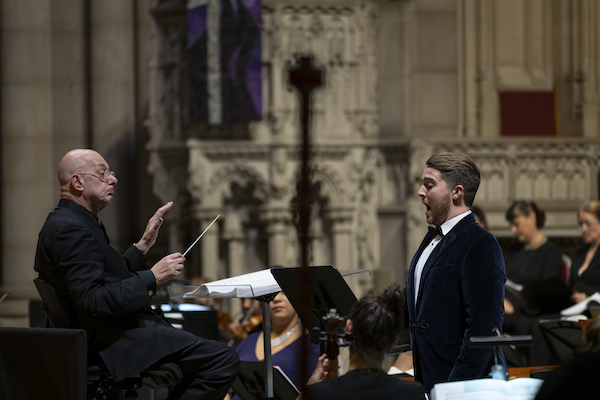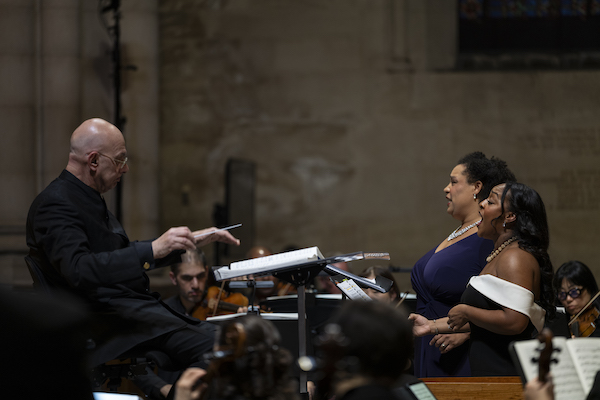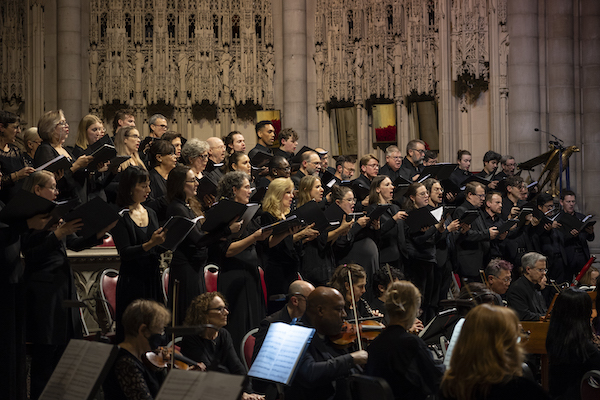A timely tale of Jewish courage in ASO’s “Judas Maccabaeus”

Once again in this period of war and dread, world events gave new meaning to a concert Thursday night, as a gesture of solidarity around Hanukkah and Christmas brought thoughts of religious identity and the cost of protecting it.
Thursday’s lively performance of Handel’s Judas Maccabaeus by the American Symphony Orchestra under Leon Botstein at the Riverside Church—telling a tale of Jewish heroism in the city’s most conspicuous edifice of Christianity—was originally meant, as Botstein wrote in the program, “to offer a friendly and reassuring program fit for the season.” But “the unanticipated context…invites further reflections.”
Contemporary reflections on Handel’s oratorios about Biblical subjects are nothing new. The composer’s English audiences understood perfectly well that these works were not just about ancient Israelites but about themselves. Composed to celebrate the victory of the Duke of Cumberland over “Bonnie Prince Charlie” and the French-backed Scots at Culloden, Judas Maccabaeus invited Englishmen to identify with the fighting Maccabees who brought religious liberty to the Jews of the Seleucid Empire in 164 BCE.
Botstein’s program essay, supplementing informative notes on the piece by Byron Adams, brought in everything from Gibbons’s Decline and Fall of the Roman Empire to the establishment of the State of Israel in 1948 to reflect on the history of the Jews and anti-Semitism, concluding that “all of us are obliged by virtue and necessity to work together on behalf of a world of peace and justice.”
The performance itself, however, focused on a faithful rendering of Handel’s, and librettist Thomas Morell’s, story of mourning a dead leader, the rising up of a new one, and winning peace and freedom on the battlefield and in the chambers of diplomacy.
The expansive nave of the Riverside Church, though modeled after the cathedral at Chartres, does not have echoing cathedral acoustics, owing to the faux-stone sound-absorbing material that covers its walls. Thanks to that, the detailed work of the small orchestra, soloists, and the 50-voice chorus—directed by James Bagwell and comprising members of the Bard Festival Chorus and the church’s own Riverside Choir—came through clearly.
Because of its ceremonial nature, the oratorio had only three named characters: the military leader Judas, his brother and cheerleader Simon, and Eupolemus, the Jewish emissary to Rome, who appeared briefly in Act III. The Jewish people were represented by the chorus and by two soloists in the roles of “Israelitish Man” and “Israelitish Woman,” soprano and mezzo-soprano respectively. Most of the burden of telling the story and reflecting on it fell on the chorus and the two Israelite soloists, who did their duty splendidly.
The chorus put the text across clearly when singing together in homophony, and were crisp and lucid in Handel’s vigorous fugues, notably the famous concluding “Hallelujah! Amen.” The oratorio’s hit tune, the hymn-like “See, the conqu’ring hero comes,” rang out during Act III in women’s voices, horn and flute solos, and a triumphant tutti.

Soprano Brandie Sutton as the Woman comforted her people in the pastoral “Pious orgies, pious airs,” and floated a bell-like tone in the saucy, dancing aria “From mighty kings he took the spoil.”
Mezzo-soprano Deborah Nansteel mourned Judas’s and Simon’s fallen father in dusky tones at the beginning of Act I (“Well may your sorrows, brethren, flow”), and later robustly praised Judas’s military prowess (“So rapid thy course is”). Five finely tuned duets by Sutton and Nansteel were highlights of the evening.
As Judas, Jack Swanson exulted, exhorted, preached, and summoned his people to battle in a fresh, ringing tenor that would stir the laziest Israelite. Vigorous melismas on one syllable in arias like “How vain is man who boasts in fight” made the heroics not just military but vocal.
Judas could hardly have asked for more brotherly support than that provided by the broad and powerful bass of William Guanbo Su as Simon, whether exhorting (“Arm, arm ye brave”) or praying (“With pious hearts, and brave as pious”).
Chorister Steven Moore as Eupolemus firmly delivered the good news that, because of Judas’s victories, the Roman Senate would protect the Jews’ religious freedom. His choral colleagues Allison Gish, Roderick Gomez, and Sean Fallen shone in messenger roles or in choral solos.
Under Botstein’s direction, the compact orchestra of 22 strings and double woodwinds realized Handel’s imaginative scoring to weave moods mournful, resolute, prayerful, anxious, and triumphant. With a sure sense of tempo and dramatic pacing, the conductor drew out a fluid legato one moment and set the music dancing the next.
The excited buzz in the audience following the final “Amen” suggested that the performers’ original goal of seasonal friendliness and reassurance had been achieved, for the moment at least.
The American Symphony Orchestra’s live concert film of Taneyev’s oratorio At the Reading of a Psalm is available online and on demand through Jan. 26, 2024. americansymphony.org
